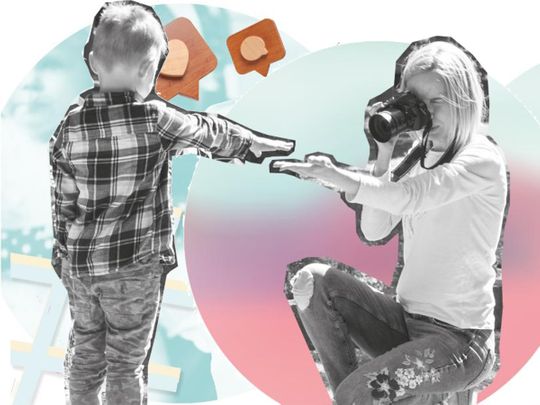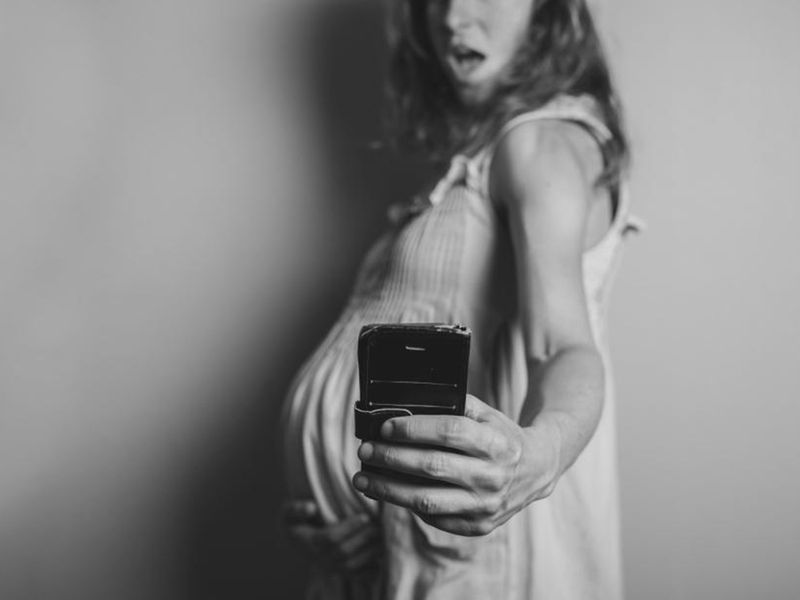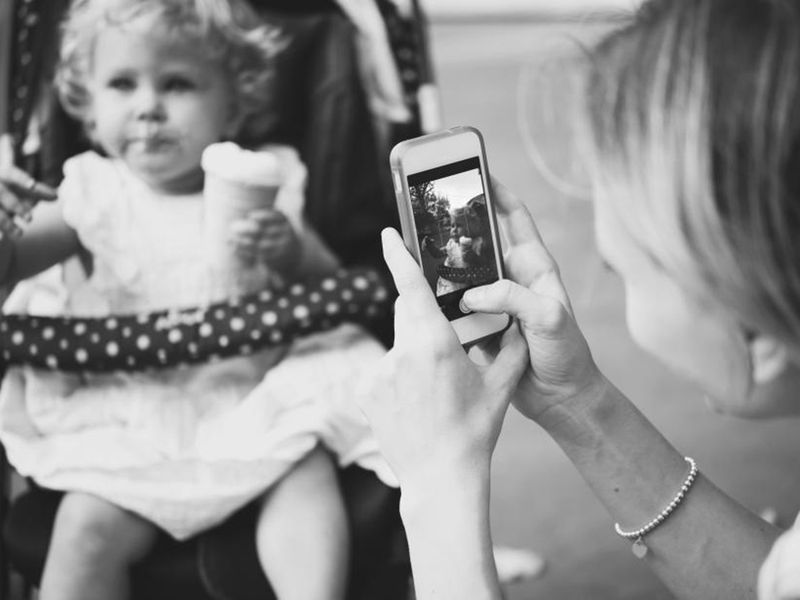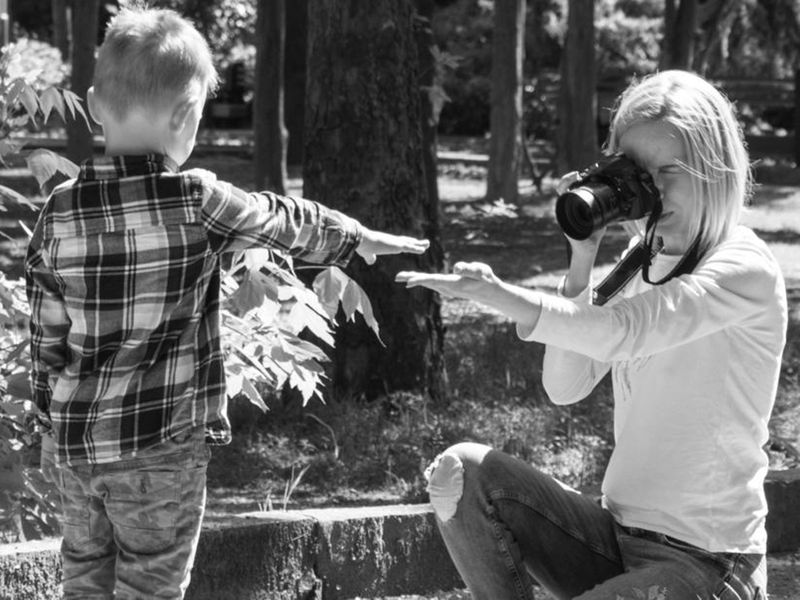
Head to any family-friendly spot in Dubai and you’re sure to see at least one. A mother, probably beautifully groomed, lining up her fashionably dressed children for an Instagram-friendly photo.
Perhaps that perfectly posed portrait will never leave her smartphone, or maybe it’s just to send to family and friends. Or perhaps it’s for her followers – hundreds, thousands or even millions of fans (aka strangers) scrolling through her profile to be influenced by her perfectly curated ‘parenting content’.
In this age of constant connection, the concept of shooting and sharing images of our kids is nothing new. Most of us do it. While some parents get so good at it they can turn it into a career, transforming their everyday lives into a literal family business, the majority of us are just proud parents, bursting to share our gorgeous children with anyone interested enough to pay attention.
For the most part, it is harmless, and a fun way to connect with other parents and celebrate the beauty of family life.
But what are the potential risks and ethics of sharing images of your child online? And what happens when that child grows up and realizes that all of his or her special moments have been documented for all the world to see?
Consider yourself influenced
Follow certain influencers, bloggers, and even everyday Instagrammers, and you soon know more about their offspring than your own relatives' and friends' kids. You might watch virtual strangers' little ones slurping spaghetti in high chairs, or swinging from monkey bars. Perhaps you give the kids a 'heart' as they dig on the beach in their swim diapers, or splash about in the bath. You catch glimpses of their vacations, nursery school graduations, the gifts they got for their birthdays. You may even see them before they unknowingly embark on their online journey in grainy monochrome or 4D ultrasound scans.
The ethics around sharing photographs of our children with the online world - for fun, to build a following, or to make money - have always lived in a grey zone. Lately, though, they're receiving closer scrutiny. Recent active threads on Mummy forums have not only seen parents criticising bloggers and influencers about the transparency of their sponsored posts, but also suggesting that they are exploiting their children online.
One of the most famous #Instamum cautionary tales is that of Clemmie Hooper, a well-known UK-based Instagram star (formerly @mother_of_daughters) who published a book and promoted multiple brands off the back of her social media profile, but then suspended her Instagram account in 2018 following her experience of what she described as repeated online abuse. After returning to the platform, she has seemingly deleted her account once again, following the shocking public revelation that she had in fact been secretly trolling fellow mumfluencers under a different online pseudonym.
While hers is an extreme case, Hooper's struggle with the two very different faces of popular opinion highlight the dangerous ambivalence of an online world filled with strangers.
Meanwhile a 2020 Reddit post by a user named ‘FinallyAnonymous6’ carried the title “My mum is an influencer. I am sick of being a part of it,” and was supposedly written by the teen child of a professional mummy blogger, complaining about the intrusion of privacy that she experiences at the hands of her snap-happy mother. It went viral, with almost 40,000 reactions in support of the poster, who says she has taken to wearing a hoodie with the words ‘No Photos’ on the front to prevent any further photography.
There have already been several cases of adult children suing their parents for sharing photos of them online wihtout their consent, while thanks to strict privacy laws in France, parents could face a year in prison or fine of up to Dh192,000 for posting pictures of their children without their consent.
The 'Sharent' Trap
While some mums have become famous by showcasing their own and their children's lives online, most of us post pictures of our kids to keep family and friends up to date and occasionally humble brag about something our little ones have done well. We share so much about our kids' lives online today that there's even a new cringe-worthy word for it: sharenting. It describes parents' regular use of social media to share news and photos of their children, whether it's documenting the potty-training years, or making fun of sulking teens.

Generation Overshare
The details that we share on social media give food for thought. According to a study by internet security firm AVG, in the US alone 92% of two-year-olds already have an online presence. When children appear in Facebook photos, 45.2% of the posts mention the child's first name, and 6.2% reference the child's date of birth. On Instagram, 63% of parents reference their child's first name in at least one photo in their feed, 27% of parents reference their child's date of birth, and 19% share both pieces of information.
A University of Michigan study, meanwhile, explored how we share online, finding that 56% of mums and dads shared potentially embarrassing information about their children online, 51% provided information that could lead to an identification of their child's location at a given time, and 27% of participants shared potentially inappropriate photos.
But Dr Rose Logan, Dubai-based clinical psychologist, says - putting statistics aside for a moment - that, "most modern parents are actually quite evolved around understanding how sharing their children's images online may affect them now and in the future. Most of us know that it's important to share only appropriate information and photographs."
As a rule of thumb, Dr Logan suggests asking yourself, 'how would your child feel if he or she saw that post in 20 years' time?' Dr Logan adds: "Whatever your answer, children should always have the right to step away from the camera, or be taken out of a post, if they don't feel comfortable. It's important for parents to respect children's rights and discuss what they feel comfortable sharing. This comes through continual age-appropriate dialogue, keeping in mind that their views might change as they grow up."

A Tangled Web
While there are undoubtedly moral dilemmas about sharing certain pictures of children online, there are real dangers too. One of them involves data brokers. With the children's merchandise market being worth hundreds of billion dollars in the US alone, data brokers seek to compile dossiers on children. Using the information that parents post about their kids online, these people create mini-profiles that companies add to throughout an individual's life.
Researchers at New York University have further explored how generally shared 'personally identifiable' information or data can pose a risk to young people. When parents share information on their social media feeds, they are often sharing with more than just the individuals they would consider friends in face-to-face relationships. This reality, coupled with the fact that "relatives or acquaintances perpetrate 76% of kidnappings and 90% of all violent crimes against juveniles," suggests that social media feeds could reveal personal information about the location, likes, and dislikes of a child to those who might wish to harm him or her. The same information could become subject to surveillance by various agencies, both governmental and nongovernmental.
There are other dark, ominous dangers when it comes to sharing personal information and photos of our children online. An Emory Law study, 'Sharenting: Children's Privacy in the Age of Social Media', reveals that while parents act with good intentions when they share personal information and photos of their children online, most do so without being fully informed of the consequences of their disclosures, and are unaware of the long-term effects. One example highlights the case of a mother discovering that innocent photos of her twins toilet training were accessed, downloaded, altered, and shared on a website commonly used by paedophiles. Terrifyingly, this is not uncommon. According to Dr Kristy Goodwin, technology and development expert, speaker, author and mum: "Research suggests that 50% of the images that paedophile sites share is taken from parents' social media sites."
The sad truth is - as much as we might not want to admit it - we lose control of where our kids' photos end up as soon we share them online.
Likes, Look-Ism And Self-Esteem
But what about the possible psychological impact that parents' frequent online sharing could have on their young children? If kids see their parents editing, filtering, and posting photos of them to get more 'likes', surely a connection between the number of 'hearts' and their appearance could eventually form, affecting self-esteem?
Steve Biddulph, Australian author, activist, and psychologist says that exposure to, and on, the digital world is already negatively affecting children. The outspoken anti-screen advocate says that an aggressive culture of 'look-ism' - something that he says has been created by decades-worth of TV watching and now social media - perpetuates the idea that "children's looks are the most important thing". During a radio interview with Australian station Hope 103.8, Biddulph spoke about the devastating effects of look-ism, including self-esteem issues and anxiety in very young people. While Biddulph focused mostly on girls during his interview, he added that surveys suggest that look-ism is "also now crossing over to boys as well".

Consent Is Key
So, what should we do? Mums and dads who go online with the goal of turning themselves and their little ones into social media stars are one thing, but what about those of us who just want to share a picture of our child playing with a Paw Patrol toy?
"I think it's increasingly difficult to control all of the content we share online, regardless of privacy settings," says writer, TV presenter, and mother of two, Dina Butti (@dinabutti). "I try to focus on creating content that I wouldn't worry about being shared. I try to imagine my boys as teenagers or adult men and consider how photos would affect them. I have rules though. No nude pictures, no potty pictures, and no photos of schools, or where we live. I'm sure though that no matter how hard I try, I'll make some mistakes, and I'm prepared for that."
Laura Buckwell (@laurabuckwell), former news anchor, event MC, and mother, agrees. "I make sure there is no image that could be taken the wrong way, or manipulated into being something it's not, as I've heard this is what the deep web thrives on. I never do live posts, as I would rather not share my exact location. I don't post about where my child goes to school or images with school uniforms in them. Most importantly, I plan to keep my children involved in the conversation."
Dr Rose agrees that early discussion and consent is vital if you're sharing photos of your kids anywhere, even through private WhatsApp groups. "When people share or post without sensitivity or care, it can be challenging for children to see themselves on a public forum.
"If children are being repeatedly asked to pose or to behave in a certain way to get that perfect Insta-worthy shot, the impact could be very negative. Kids may feel like they've become an object, valued only for what they can bring to their parents' online identity, and for their appearance.
"With that in mind, if parents are using their children as a mechanism to drive attention or business - if those kids are a kind of 'product' or 'resource' - then, in a way, they may feel exploited. On the other hand, if their role is made clear and they are willing participants, they may feel empowered, and this could benefit how these children handle social media when they are older."
The New Online Normal
Being online, at least some of the time, is just a fact of modern life, and Dina says it's important to remember the benefits of sharing online. "I started working as a mummy presenter because I didn't have help and loved the idea of being able to bring my kids to work. I still do. I hope my boys appreciate all the awesome experiences and additional time we've had together thanks to these opportunities.
"It has also been cathartic for me to go through motherhood alongside thousands of other supportive mothers," adds Dina. "I've been openly vulnerable about my struggles with motherhood, and the love and support I've received from other mothers has been overwhelming. It's made me feel connected and heard.
"Ultimately, my sons are having fun working with mama. There may come a time in future when they don't, and that's okay. At the moment though, my boys are the best co-hosts I've ever had."
Laura agrees. "Mums featuring their kids online can be a great way to educate people on the real-life struggles of parenthood, although I do think there's also room for a lot of envy online, so it's important to take everything with a pinch of salt. People are usually only sharing a small piece of their lives online."
Posting on social media can be a prompt for dialogue with our kids about our values, says Dr Rose: "We can view the topic of online sharing as an opportunity for parents and children to have open and frank conversations that respect both party's feelings about what they want to share with the rest of the world, and why."








